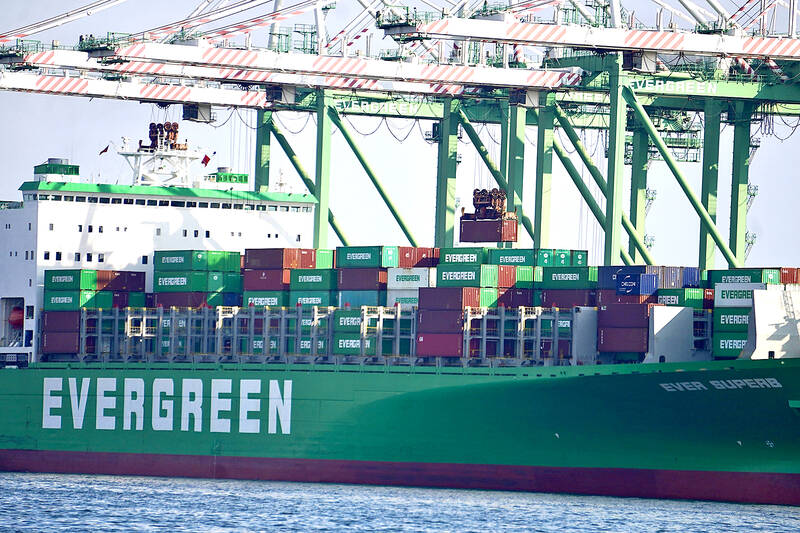Export orders expanded by 10.8 percent annually last month, the highest year-on-year growth in two years, thanks to robust demand for chips used in artificial intelligence (AI) and high-performance computing (HPC) devices mainly from Nvidia Corp, the Ministry of Economic Affairs said yesterday. It also outpaced the ministry’s upper estimate of 5.88 percent annual growth.
Export orders rose from US$42.49 billion in April last year to US$47.1 billion last month, while export orders dropped by 0.1 percent from US$47.16 billion on a monthly basis, the ministry said.
The ministry said it expects the growth momentum to carry into this month and export orders to rise between 1.8 percent and 6.2 percent annually to between US$46.5 billion and US$48.5 billion, as AI chip demand remains vigorous.

Photo: CNA
“April’s stronger performance and the growth prospects for May gave us higher confidence that export orders in the second quarter would return to growth on an annual basis, as compared with our initial estimate at the beginning of this year,” Department of Statistics Director Huang Yu-ling (黃于玲) said via telephone.
Electronic products orders soared by 22.7 percent year-on-year to US$17.1 billion last month, primarily fueled by robust demand for foundry services, chip distribution and printed circuit boards for AI-related applications and HPC devices, the ministry said. Orders from the US grew at the fastest pace of 35.8 percent.
Orders for information and communications technology products last month rose 8.4 percent annually to US$13.05 billion, backed by increased server orders on resilient demand for AI applications and cloud-based devices. Orders from Malaysia grew the highest at 53.3 percent, as manufacturers shifted production from China to the Southeast Asian country amid the US-China technology dispute.
Optoelectronics products orders expanded 13.5 percent annually to US$1.66 billion last month, attributable to increases in orders for TV panels and optoelectronic cameras. TV panel prices have also seen sustained high levels.
The price of 65-inch TV panels is to climb 1.1 percent month-on-month, or US$2 per unit, this month, extending price hikes over the past few months, market researcher TrendForce Corp (集邦科技) said yesterday.
Three major traditional sectors returned to growth last month, driven by more marked restocking demand.
Orders for basic metals, mainly for steel, rose by 3.5 percent year-on-year to US$2.23 billion last month mainly due to restocking demand, the ministry said.
Plastics product orders increased 4.2 percent annually to US$1.61 billion on inventory buildup demand, the ministry said, adding that prices were supported by higher raw material prices.
Petrochemical products orders rose by 8 percent year-on-year last month to US$1.54 billion, as OPEC increased global crude oil prices by 5.9 percent year-on-year, the ministry said.
Machinery orders shrank 3.4 percent year-on-year to US$1.59 billion last month, because increases in equipment spending from semiconductor companies were still not enough to offset the broader weakness in capacity expansion amid a slow global economic recovery, the ministry said.

TAKING STOCK: A Taiwanese cookware firm in Vietnam urged customers to assess inventory or place orders early so shipments can reach the US while tariffs are paused Taiwanese businesses in Vietnam are exploring alternatives after the White House imposed a 46 percent import duty on Vietnamese goods, following US President Donald Trump’s announcement of “reciprocal” tariffs on the US’ trading partners. Lo Shih-liang (羅世良), chairman of Brico Industry Co (裕茂工業), a Taiwanese company that manufactures cast iron cookware and stove components in Vietnam, said that more than 40 percent of his business was tied to the US market, describing the constant US policy shifts as an emotional roller coaster. “I work during the day and stay up all night watching the news. I’ve been following US news until 3am

Six years ago, LVMH’s billionaire CEO Bernard Arnault and US President Donald Trump cut the blue ribbon on a factory in rural Texas that would make designer handbags for Louis Vuitton, one of the world’s best-known luxury brands. However, since the high-profile opening, the factory has faced a host of problems limiting production, 11 former Louis Vuitton employees said. The site has consistently ranked among the worst-performing for Louis Vuitton globally, “significantly” underperforming other facilities, said three former Louis Vuitton workers and a senior industry source, who cited internal rankings shared with staff. The plant’s problems — which have not

TARIFF CONCERNS: The chipmaker cited global uncertainty from US tariffs and a weakening economic outlook, but said its Singapore expansion remains on track Vanguard International Semiconductor Corp (世界先進), a foundry service provider specializing in producing power management and display driver chips, yesterday withdrew its full-year revenue projection of moderate growth for this year, as escalating US tariff tensions raised uncertainty and concern about a potential economic recession. The Hsinchu-based chipmaker in February said revenues this year would grow mildly from last year based on improving supply chain inventory levels and market demand. At the time, it also anticipated gradual quarter revenue growth. However, the US’ sweeping tariff policy has upended the industry’s supply chains and weakened economic prospects for the world economy, it said. “Now

COLLABORATION: Given Taiwan’s key position in global supply chains, the US firm is discussing strategies with local partners and clients to deal with global uncertainties Advanced Micro Devices Inc (AMD) yesterday said it is meeting with local ecosystem partners, including Taiwan Semiconductor Manufacturing Co (TSMC, 台積電), to discuss strategies, including long-term manufacturing, to navigate uncertainties such as US tariffs, as Taiwan occupies an important position in global supply chains. AMD chief executive officer Lisa Su (蘇姿丰) told reporters that Taiwan is an important part of the chip designer’s ecosystem and she is discussing with partners and customers in Taiwan to forge strong collaborations on different areas during this critical period. AMD has just become the first artificial-intelligence (AI) server chip customer of TSMC to utilize its advanced